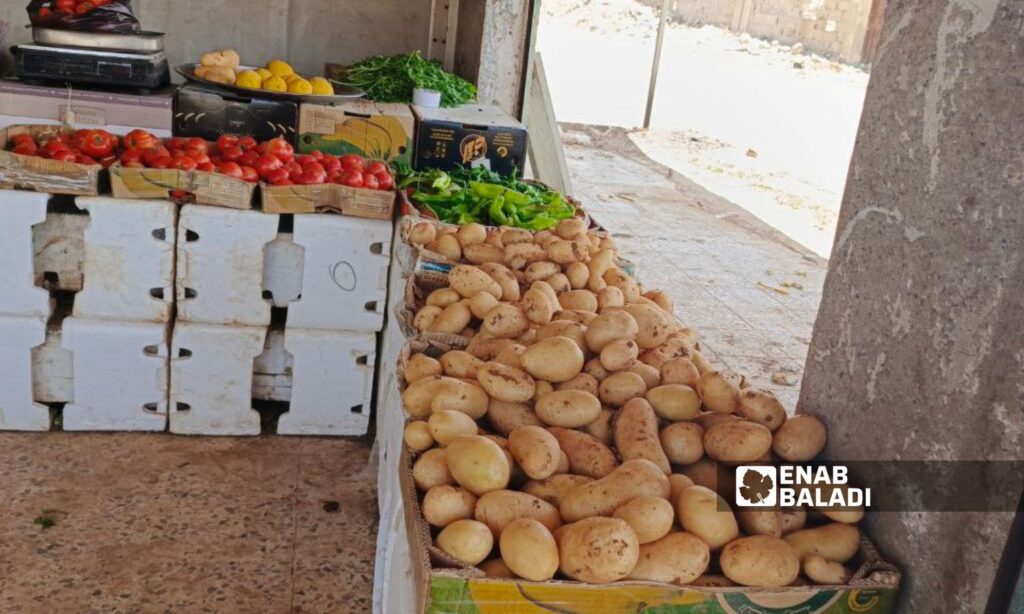Enab Baladi – Halim Muhammad
The production of potato crops in the western countryside of Daraa province, southern Syria, has dropped to about half of the spring cycle season.
The decline is attributed to farmers using local seeds (non-hybrid) due to the delay in the arrival of imported seeds, related to the refusal of the Netherlands (the exporting country) to supply seeds to Syria.
The delay in the arrival of the seeds led most farmers in the western countryside to use local seeds, which are small potatoes from the previous season preserved in cool storage until planting time.
Mohammad Kiwani, a farmer who dedicated 20 dunums to potato crops this season, told Enab Baladi that his production did not exceed one and a half tons per dunum, whereas it was about three tons in previous seasons for the same area.
Farmers typically plant spring cycle potatoes early in December and harvest them in April.
Dutch private companies stopped exporting potato seeds to Syria due to European sanctions on the Syrian regime, and shipping difficulties added to the problem.
Wail al-Tawil, director of the General Organization for Seed Multiplication, told Athr Press in December 2023 that the Dutch companies that export the seeds have halted exports due to sanctions.
He added at the time that the solutions for the institution and private companies involve searching for alternatives in the European market.
The government newspaper Tishreen mentioned that the Dutch refusal to supply potato seeds pushed officials to turn to France for seed imports, without clarifying whether they would arrive directly or via Lebanon.
Enab Baladi contacted potato seed importers in Daraa who said that the imported seeds this season are of the French Spunta variety, which has high productivity.
However, agricultural engineer Khaled Suleiman stated that Dutch Spunta seeds are leading worldwide and have proven efficiency in the Middle East, particularly in Syria.
High production costs
Farmer Youssef al-Hussein (47 years old) waited for the imported seeds and planted approximately 14 dunums. He told Enab Baladi that the price of seeds doubled this season, reaching two thousand dollars per ton, whereas in previous seasons it was one thousand dollars.
The dollar was equivalent to 6,500 Syrian pounds at the beginning of 2023, while the exchange rate stabilized at an average of 14,500 pounds since the beginning of 2024, according to the specialized currency website “The S-P Today.”
The increased cost did not stop at the price of seeds, as fertilizer prices also doubled.
A cubic meter of chicken manure reached a million Syrian pounds, compared to 500,000 pounds last season.
While a dunum typically needs three cubic meters, al-Hussein only used one cubic meter per dunum.
Prices of super phosphate fertilizer rose to 600,000 pounds per 50-kilogram bag, and a bag of urea fertilizer reached 800,000 Syrian pounds.
Additionally, daily wages for laborers rose to 30,000 Syrian pounds for five hours of work.
Despite the rise in potato prices at al-Hal markets, selling at 7,000 pounds per kilogram, the increased production costs and reduced yield decreased profit margins for farmers.
Potato crops are considered important in Daraa, ranking second in planted area after tomatoes, with cultivation concentrated in Nawa, Izraa, Tafas, and Dael.
The annual production for the fall and spring cycles is estimated at 100,000 tons.
According to the Daraa Agriculture Directorate, the area planted with the spring cycle of potatoes this season reached 1296 hectares, compared to the planned 1128 hectares, an increase of 168 hectares.











